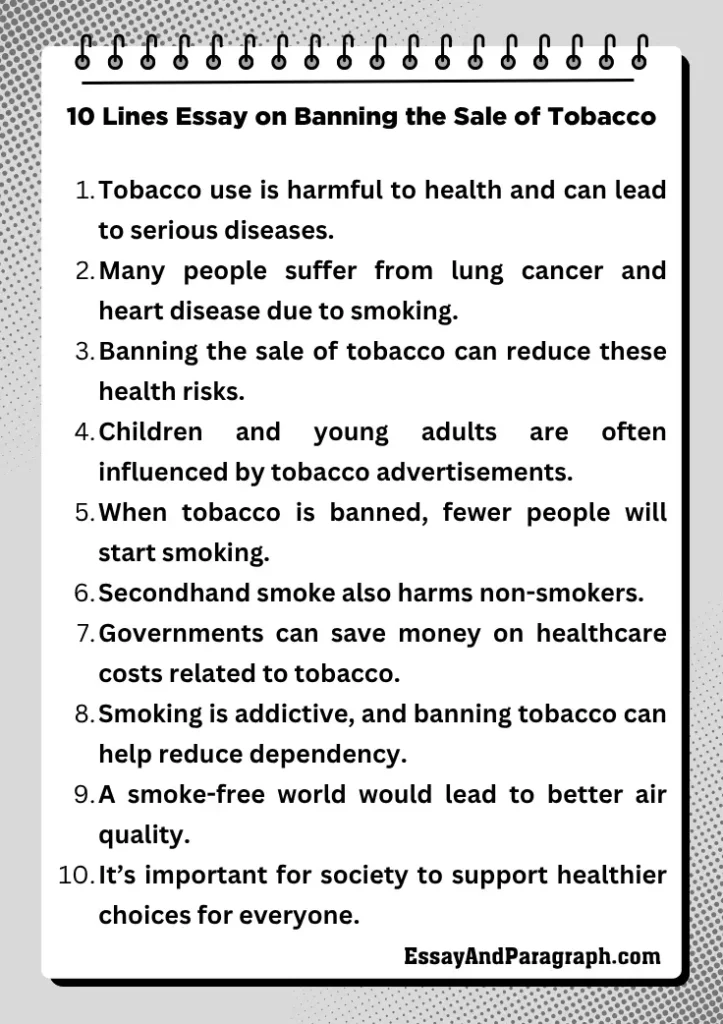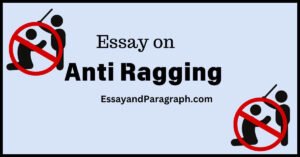Ever heard someone say, “Tobacco is harmful to health”? You’ve probably come across a lot of conversations about the dangers of tobacco use. Smoking, whether cigarettes or other tobacco products, harms not just the person smoking but also those around them. In this article, we will explore why banning the sale of tobacco could be a step towards a healthier world.
10 Lines Essay on Banning the Sale of Tobacco
Tobacco use is harmful to health and can lead to serious diseases.
Many people suffer from lung cancer and heart disease due to smoking.
Banning the sale of tobacco can reduce these health risks.
Children and young adults are often influenced by tobacco advertisements.
When tobacco is banned, fewer people will start smoking.
Secondhand smoke also harms non-smokers.
Governments can save money on healthcare costs related to tobacco.
Smoking is addictive, and banning tobacco can help reduce dependency.
A smoke-free world would lead to better air quality.
It’s important for society to support healthier choices for everyone.

Essay on Banning the Sale of Tobacco – 100 Words
Tobacco use is harmful to health, leading to diseases like lung cancer, heart disease, and respiratory problems. Banning the sale of tobacco would significantly reduce smoking rates, protect non-smokers from secondhand smoke, and lower healthcare costs. Nicotine addiction makes it hard for people to quit, but by removing tobacco from the market, fewer people would start smoking, especially young people. This would ultimately lead to healthier communities. A tobacco-free world would benefit both individuals and society, promoting better air quality and reducing preventable diseases, thus ensuring a safer, healthier future for everyone.
Essay on Banning the Sale of Tobacco – 150 Words
Tobacco use is one of the leading causes of preventable diseases, including lung cancer, heart disease, and respiratory problems. Every year, millions of people die due to smoking-related illnesses, making it a global health crisis. Banning the sale of tobacco would significantly reduce the number of smokers, especially among young people, who are often targeted by advertisements. By eliminating tobacco from the market, fewer individuals would become addicted, leading to healthier communities.
Additionally, secondhand smoke harms non-smokers, exposing them to the same health risks as smokers. A ban would improve air quality and protect everyone from the dangers of secondhand smoke. Moreover, reducing smoking rates would decrease healthcare costs, saving governments billions spent on treating tobacco-related diseases. Banning tobacco would also encourage people to make healthier lifestyle choices, promoting a smoke-free world for future generations. Overall, banning tobacco would lead to a healthier, safer world for everyone.
Short Essay on Banning the Sale of Tobacco – 200 Words
Tobacco use is one of the leading causes of preventable diseases worldwide. Smoking can cause serious health problems, such as lung cancer, heart disease, and even death. Tobacco contains harmful chemicals that affect the lungs and heart, making it dangerous for both smokers and those around them.
One of the main reasons for banning the sale of tobacco is to protect the health of society. Smoking not only damages the smoker’s health but also exposes others to secondhand smoke. Many non-smokers unknowingly inhale harmful tobacco smoke, leading to similar health issues.
Banning tobacco would reduce the number of people who start smoking, especially young people. Tobacco advertisements often target children and teenagers, making them more likely to try smoking. By removing tobacco from the market, fewer people would become addicted, leading to a healthier future.
Governments can also save on healthcare costs related to treating tobacco-related diseases. Reducing smoking rates would ultimately lead to fewer health complications and lower medical expenses, benefiting society as a whole.
Essay on Banning the Sale of Tobacco – 250 Words
Tobacco use has long been a major public health issue, responsible for millions of deaths each year due to smoking-related diseases like lung cancer, heart disease, and respiratory problems. Despite the known dangers, tobacco remains widely available, causing harm to smokers and non-smokers alike. Banning the sale of tobacco would be a powerful step in reducing these health risks and protecting individuals, especially vulnerable groups like children and teenagers, from the harmful effects of smoking.
Nicotine, the addictive substance in tobacco, makes quitting smoking very difficult. By banning tobacco products, fewer people would start smoking, leading to a decrease in the number of new smokers, particularly young people. This would help break the cycle of addiction and reduce the number of tobacco-related diseases in the long run.
Another critical aspect of tobacco use is the harm caused by secondhand smoke. Non-smokers who are exposed to tobacco smoke can experience serious health problems, including lung cancer and heart disease. A ban on tobacco sales would help eliminate secondhand smoke exposure, improving public health and air quality.
Additionally, banning tobacco would lead to significant savings in healthcare costs. The financial burden of treating tobacco-related illnesses is enormous, with billions spent annually in healthcare systems around the world. Removing tobacco from the market would ultimately reduce these costs, benefiting society as a whole.
In conclusion, banning the sale of tobacco would improve public health, protect non-smokers, save lives, and reduce healthcare costs, making it a crucial step towards a healthier future for everyone.
Long Essay on Banning the Sale of Tobacco – 500 Words
Tobacco consumption has been a longstanding issue that affects individuals and societies around the world. Every year, millions of people die due to diseases caused by smoking, including lung cancer, emphysema, and heart disease. The World Health Organization (WHO) estimates that tobacco kills over 8 million people each year globally, with more than 7 million of these deaths being the result of direct smoking, and around 1.2 million occurring due to secondhand smoke exposure. This staggering statistic highlights the urgent need to rethink the accessibility and sale of tobacco products.
Banning the sale of tobacco could significantly reduce smoking rates. It is well known that nicotine, the addictive substance in tobacco, causes dependency. As a result, millions of people struggle to quit smoking despite the harmful effects. When tobacco is readily available, people, especially teenagers, are more likely to try smoking. These individuals often become addicted, making it harder for them to quit in the future. By banning tobacco products, society would take a major step in reducing the number of new smokers and ultimately lowering addiction rates.
Additionally, secondhand smoke is another serious concern that affects millions of non-smokers. When someone smokes in a public space, people nearby, including children, inhale harmful chemicals, which can lead to respiratory problems, heart disease, and cancer. Banning tobacco would significantly improve air quality and protect non-smokers from these harmful effects.
The economic argument for banning tobacco is also strong. According to the Centers for Disease Control and Prevention (CDC), the United States spends more than $300 billion annually on smoking-related healthcare costs and lost productivity. By eliminating the sale of tobacco, governments would reduce healthcare expenses, which would otherwise burden public health systems.
While banning tobacco is a drastic measure, it could save lives, improve public health, and reduce smoking-related diseases. The move would not only decrease the number of smokers but also protect the health of those who do not smoke. Society could focus more on providing resources and support for people who want to quit smoking, offering alternative ways to help individuals live healthier lives. The future outlook suggests that with greater support and less access to tobacco products, a smoke-free world may be within reach.
FAQs
1. Why is tobacco so harmful to health?
Tobacco contains harmful substances like nicotine, tar, and carbon monoxide that affect the body in many ways. Smoking can lead to diseases like lung cancer, heart disease, and respiratory disorders. Nicotine is highly addictive, making it difficult for smokers to quit, even when they know it is harmful. The chemicals in tobacco smoke also affect the lungs, causing breathing problems and damage to the airways. Banning tobacco could reduce these health risks, protecting both smokers and non-smokers.
2. What are the benefits of banning the sale of tobacco?
Banning the sale of tobacco would have numerous benefits. First, it would reduce the number of people starting to smoke, especially young people. Second, it would protect non-smokers from the dangers of secondhand smoke. Third, it could save governments significant healthcare costs associated with smoking-related diseases. Finally, it would promote a healthier lifestyle, encouraging people to make better choices for their well-being.
3. How would banning tobacco impact society?
Banning tobacco would lead to fewer health problems caused by smoking. It would reduce the number of smokers, thereby lowering the rates of diseases such as lung cancer and heart disease. Additionally, there would be a reduction in secondhand smoke, making public spaces cleaner and safer. Socially, the stigma around smoking would grow, leading to healthier lifestyle choices across generations. Overall, society would benefit from improved public health and lower healthcare costs.
4. Are there any alternatives to tobacco that could help smokers quit?
Yes, there are several alternatives that can help smokers quit, such as nicotine replacement therapy (NRT), which includes patches, gum, and lozenges. These products provide a lower dose of nicotine without the harmful chemicals found in tobacco. Other methods include prescription medications, counseling, and support groups. These alternatives have been proven effective in helping people quit smoking, and they can be used alongside other strategies to reduce cravings and withdrawal symptoms.
5. How does smoking affect the environment?
Smoking not only harms human health but also the environment. Cigarette butts, which are made of non-biodegradable materials, are one of the most littered items worldwide. The chemicals in cigarettes can pollute the soil and water, damaging ecosystems. Additionally, the production of tobacco contributes to deforestation, as land is cleared to grow tobacco plants. By banning the sale of tobacco, we would also reduce its environmental impact, making the world a cleaner, healthier place.
Top 5 Quotes on Banning the Sale of Tobacco
“Tobacco is a silent killer, and banning its sale is a step toward saving lives.”
“Every cigarette you smoke is a vote for an unhealthy future.”
“Banning tobacco is not just a choice; it’s a responsibility to future generations.”
“The best way to prevent smoking-related diseases is to stop smoking before it starts.”
“A smoke-free world is a healthy world, for everyone.”

Essay on Banning the Sale of Tobacco
Summary :
Banning the sale of tobacco could be one of the most effective ways to improve public health. Tobacco use is the leading cause of preventable diseases, including lung cancer, heart disease, and respiratory problems. By removing tobacco from the market, we would reduce the number of smokers, especially among young people, and protect non-smokers from secondhand smoke. Moreover, the savings in healthcare costs could benefit society in many ways. While the ban would have significant social and economic impacts, the potential benefits in terms of health and well-being far outweigh the challenges. With stronger laws and more awareness, the world can move toward a healthier, tobacco-free future.




